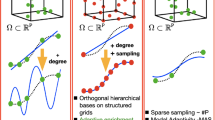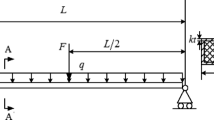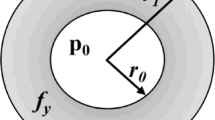Abstract
Global sensitivity analysis is of great significance for risk assessment of structural systems. In order to efficiently perform sensitivity analysis for systems with multivariate output, this paper adopts Kriging-based analytical (KBA) technique to estimate multivariate sensitivity indices (MSI). Two MSI are studied in this paper, namely, MSI based on principal component analysis (MSI-PCA) and MSI based on covariance decomposition (MSI-CD). For MSI-PCA, Kriging models of inputs and each retained output principal component (PC) are firstly established, and then KBA technique is used to derive the sensitivities associated with each retained PC and the generalized MSI-PCA. For MSI-CD, Kriging model is constructed to map input variables and each time output variable, based on which subset variances and the corresponding MSI-CD are derived by KBA technique. In addition, to avoid constructing Kriging model at each time instant when calculating MSI-CD, a new double-loop Kriging (D-Kriging) method is developed to further improve the efficiency. The accuracy and efficiency of KBA and D-Kriging methods for MSI estimation are tested and discussed by four examples in Sect. 4.




















Similar content being viewed by others
References
Abdi H, Williams LJ (2010) Principal component analysis. Wiley Interdisciplinary Reviews: Computational Statistics 2(4):433–459
Aït-Sahalia Y, Xiu D (2019) Principal component analysis of high-frequency data. J Am Stat Assoc 114(525):287–303
Alexanderian A, Gremaud PA, Smith RC (2020) Variance-based sensitivity analysis for time-dependent processes. Reliab Eng Syst Saf 196:106722
Arwade SR, Moradi M, Louhghalam A (2010) Variance decomposition and global sensitivity for structural systems. Eng Struct 32(1):1–10
Borgonovo E (2007) A new uncertainty importance measure. Reliab Eng Syst Saf 92(6):771–784
Borgonovo E, Plischke E (2016) Sensitivity analysis: a review of recent advances. Eur J Oper Res 248(3):869–887
Campbell K, McKay MD, Williams BJ (2006) Sensitivity analysis when model outputs are functions. Reliab Eng Syst Saf 91(10–11):1468–1472
Chen W, Jin R, Sudjianto A (2005) Analytical variance-based global sensitivity analysis in simulation-based design under uncertainty. J Mech Des 127(5):875–886
Cheng K, Lu Z, Zhou Y, Shi Y, Wei Y (2017) Global sensitivity analysis using support vector regression. Appl Math Model 49:587–598
Cheng K, Lu Z, Zhang K (2019) Multivariate output global sensitivity analysis using multi-output support vector regression. Struct Multidiscip Optim 59(6):2177–2187
Cheng K, Lu Z, Ling C, Zhou S (2020) Surrogate-assisted global sensitivity analysis: an overview. Struct Multidiscip Optim 61(3):1187–1213
Gamboa F, Janon A, Klein T, Lagnoux A (2013) Sensitivity indices for multivariate outputs. CR Math 351(7–8):307–310
Garcia-Cabrejo O, Valocchi A (2014) Global sensitivity analysis for multivariate output using polynomial chaos expansion. Reliab Eng Syst Saf 126:25–36
Guo M, Hesthaven JS (2019) Data-driven reduced order modeling for time-dependent problems. Comput Methods Appl Mech Eng 345:75–99
Handbook of uncertainty quantification. New York: Springer, 2017.
Kafali C, Grigoriu M (2007) Seismic fragility analysis: Application to simple linear and nonlinear systems. Earthquake Eng Struct Dynam 36(13):1885–1900
Lamboni M, Monod H, Makowski D (2011) Multivariate sensitivity analysis to measure global contribution of input factors in dynamic models. Reliab Eng Syst Saf 96(4):450–459
Li L, Lu Z, Chen C (2016a) Moment-independent importance measure of correlated input variable and its state dependent parameter solution. Aerosp Sci Technol 48:281–290
Li L, Lu Z, Wu D (2016b) A new kind of sensitivity index for multivariate output. Reliab Eng Syst Saf 147:123–131
Ling C, Lu Z, Feng K, Sun B (2019) Efficient numerical simulation methods for estimating fuzzy failure probability based importance measure indices. Struct Multidiscip Optim 59(2):577–593
Liu F, Wei P, Tang C, Wang P, Yue Z (2019) Global sensitivity analysis for multivariate outputs based on multiple response Gaussian process model. Reliab Eng Syst Saf 189:287–298
Liu Y, Li L, Zhou C, Zhao H (2020) Efficient multivariate sensitivity analysis for dynamic models based on cubature formula. Eng Struct 206:110164
Lophaven S N, Nielsen H B, Søndergaard J. DACE: a Matlab Kriging toolbox, version 2.0. Lyngby (Denmark), IMM Technical University of Denmark, 2002.
Mara TA, Tarantola S, Annoni P (2015) Non-parametric methods for global sensitivity analysis of model output with dependent inputs. Environ Model Softw 72:173–183
Rochman D, Zwermann W, van der Marck SC, Koning AJ, Sjöstrand, Helgesson P, Krzykacz-Hausmann B (2014) Efficient use of Monte Carlo: uncertainty propagation. Nucl Sci Eng 177(3):337–349
Saltelli A (2002a) Sensitivity analysis for importance assessment. Risk Anal 22(3):579–590
Saltelli A (2002b) Making best use of model evaluations to compute sensitivity indices. Comput Phys Commun 145(2):280–297
Saltelli A, Marivoet J (1990) Non-parametric statistics in sensitivity analysis for model output: A comparison of selected techniques. Reliab Eng Syst Saf 28(2):229–253
Saltelli A, Annoni P, Azzini I, Campolongo F, Ratto M, Tarantola S (2010) Variance based sensitivity analysis of model output Design and estimator for the total sensitivity index. Comput Phys Commun 181(2):259–270
Saltelli A, Ratto M, Andres T, Campolongo F, Cariboni J, Gatelli D, Saisana M, Tarantola S (2008) Global sensitivity analysis: the primer. John Wiley & Sons
Sobola IM (2001) Global sensitivity indices for nonlinear mathematical models and their Monte Carlo estimates. Math Comput Simul 55(1):271–280
Su G, Peng L, Hu L (2017) A Gaussian process-based dynamic surrogate model for complex engineering structural reliability analysis. Struct Saf 68:97–109
Sudret B (2008) Global sensitivity analysis using polynomial chaos expansions. Reliab Eng Syst Saf 93(7):964–979
Sun X, Choi JI (2021) Non-intrusive reduced-order modeling for uncertainty quantification of space–time-dependent parameterized problems. Comput Math Appl 87:50–64
Sun X, Choi YY, Choi JI (2020) Global sensitivity analysis for multivariate outputs using polynomial chaos-based surrogate models. Appl Math Model 82:867–887
Wan H, Ren W, Todd MD (2020) Arbitrary polynomial chaos expansion method for uncertainty quantification and global sensitivity analysis in structural dynamics. Mech Syst Signal Process 142:106732
Wu Z, Wang D, Okolo P, Hu F, Zhang W (2016) Global sensitivity analysis using a Gaussian radial basis function metamodel. Reliab Eng Syst Saf 154:171–179
Xiao S, Lu Z, Qin F (2017) Estimation of the Generalized Sobol’s sensitivity index for multivariate output model using unscented transformation. J Struct Eng 143(5):06016005
Xiao S, Lu Z, Wang P (2018a) Multivariate global sensitivity analysis for dynamic models based on energy distance. Struct Multidiscip Optim 57(1):279–291
Xiao S, Lu Z, Wang P (2018b) Global sensitivity analysis based on distance correlation for structural systems with multivariate output. Eng Struct 167:74–83
Xiao M, Lu D, Breitkopf P, Raghavan B, Dutta S, Zhang W (2020) On-the-fly model reduction for large-scale structural topology optimization using principal components analysis. Struct Multidisc Optim 62(1):209–230
Xu L, Lu Z, Xiao S (2019) Generalized sensitivity indices based on vector projection for multivariate output. Appl Math Model 66:592–610
Yun W, Lu Z, Jiang X (2018) An efficient reliability analysis method combining adaptive Kriging and modified importance sampling for small failure probability. Struct Multidiscip Optim 58(4):1383–1393
Zhang K, Lu Z, Wu D, Zhang Y (2017) Analytical variance based global sensitivity analysis for models with correlated variables. Appl Math Model 45:748–767
Zhou S, Lu Z, Ling C, Yun W (2021) Global reliability sensitivity analysis index and its efficient numerical simulation solution in presence of both random and interval hybrid uncertainty. Struct Multidisc Optim 63(2):551–573
Acknowledgements
This work was supported by the National Natural Science Foundation of China (Grant No. NSFC 51875464), and the Fundamental Research Funds for the Central Universities, and the Innovation Foundation for Doctor Dissertation of Northwestern Polytechnical University (CX2022003).
Funding
National Natural Science Foundation of China, Grant No. NSFC 51875464, Luyi Li,Fundamental Research Funds for the Central Universities, Luyi Li, the Innovation Foundation for Doctor Dissertation of Northwestern Polytechnical University, CX2022003, Yushan Liu.
Author information
Authors and Affiliations
Corresponding author
Ethics declarations
Conflict of interest
The authors declared that they have no conflicts of interest in this work, we declare that we do not have any commercial or associative interest that represents a conflict of interest in connection with the work submitted.
Replication of results
The necessary information for replication of the results has been presented in Sect. 3.2. The relevant codes for the algorithms could be available on request by emailing the first author.
Additional information
Publisher's Note
Springer Nature remains neutral with regard to jurisdictional claims in published maps and institutional affiliations.
Responsible Editor: Christian Gogu
Rights and permissions
Springer Nature or its licensor holds exclusive rights to this article under a publishing agreement with the author(s) or other rightsholder(s); author self-archiving of the accepted manuscript version of this article is solely governed by the terms of such publishing agreement and applicable law.
About this article
Cite this article
Liu, Y., Li, L., Chang, Z. et al. Kriging-based analytical technique for global sensitivity analysis of systems with multivariate output. Struct Multidisc Optim 65, 288 (2022). https://doi.org/10.1007/s00158-022-03362-2
Received:
Revised:
Accepted:
Published:
DOI: https://doi.org/10.1007/s00158-022-03362-2




